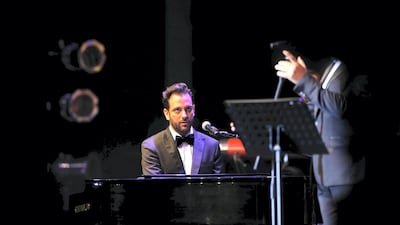There’s an existential question that gnaws at the heart of many artists: what is it that I am trying to do with my work?
This was the main thought nearly two decades ago for Guy Manoukian as he was making his name in Beirut as an adept, yet not particularly standout pianist. Fresh from a concert full of western-style compositions, he recalled a "person of note in the music industry" sitting down with him for a coffee.
“He told me I was stupid,” Manoukian recalls. “He told me that I had all this great heritage to draw from and that I should use it to create music.” Manoukian described that memorable exchange as the wake-up call the young performer needed, which then helped him navigate his way through the Lebanese music scene towards stardom.
Creating honest music
With the scene dominated by vocalists, Manoukian realised there was a way open to him to create evocative instrumental compositions laced with the Lebanese and Armenian flavours of his heritage.
Manoukian says once he went down this path success was almost immediate. This new approach resulted in his 2002 single Harem Confessions, which became both a regional hit and a calling card.
The track is a mix of styles. Thumping dance beats are paired with the mournful oriental sounds of the ney and a host of Arabic percussion elements. Weaving in and out of those rhythms are Manoukian's keyboards riffs, which vary from funk to full distortion effects.
Manoukian says the track remains the best distillation of his free-wheeling approach to his craft, which blurs the lines between east and west. "I realised the music I was making must reflect who I was. Before, I was trying to be someone like [Greek world music star] Yanni and these people. Then I took a decision to be true and honest to myself," he says. "And that is, I am Lebanese of Armenian origin. I live in Lebanon, speak Arabic, love the music of Warda and Fairuz, but at the same time I love Chris de Burgh, Duran Duran and Coldplay. What I am doing is not fusion, but honest music."
That sense of making music that reflects who he is has drove Manoukian's work ever since. His albums – 2009's Assouman and 2014's Nomad – topped various regional charts. He remains a big draw in Lebanon whenever he performs, and he has just completed another sell-out summer tour.
A sense of duty
Manoukian also expanded his global reach by standing out through his defiantly Arab approach, performing at Australia's Sydney Opera House five years ago and the London Palladium in May.
He is now set to be the first Lebanese musician to headline his own show at Dubai Opera (previous Lebanese acts Yasmine Hamdan and The Wanton Bishops performed as part of a festival). Manoukian views the Dubai show as another important moment in his career.
I have seen Manoukian perform in both Beirut and Dubai, and I mention to him that his hometown gig was a much looser and experimental affair. Manoukian agrees that he reins in his adventurous spirit somewhat when playing abroad out of a sense of responsibility to the Lebanese and Armenian diaspora. "When I play somewhere like Dubai, or in cities where the Lebanese and Armenian communities are, they expect me to bring them a taste of home and I never want to disappoint them," he explains. So, backed by his orchestra, Manoukian's Saturday show will include vintage classics by artists such as Egyptian giants Umm Kulthum and Abdel Halim Hafez, in addition to Lebanese crooner Zaki Nassif.
“Look, life is too short to be precious about this,” he says. “Life is also tough for a lot of people and concert tickets are not cheap and people want to have fun. So I will give them that dose of Beirut and nostalgia and do it in a way where I don’t lose my art in the mix.”
Gleaming in the lights of the stage will be Manoukian's timepiece, a regal Baume et Mercier watch that his father left him upon his passing. Manoukian credits his father for encouraging him to take on music at the age of four as a form of self-development.
Now a father of three, Manoukian is concerned at how electronics are now taking children away from instruments. "I was hooked on the piano because I was born during the civil war and the piano didn't need electricity," he says. "Now, everything is on-demand and within reach and today's generation are preoccupied with other things like iPads and X-Boxes. I'm worried about the seriousness and of the focus of this generation towards an instrument.
“In a world where everything is so easy and steps away, I wonder if there is patience any more in taking it on.”
Manoukian's touring schedule, which includes a debut run of South American performances next year, has been constant, and it's now four years since he released a new album. But he confirms that a new record is in the works, and that it will include the composition Saida In My Heart, which he describes as a personal favourite.
"Just give me about 40 days to compile, mix and master the songs and it will be ready," the pianist says. "It will be out next year."
Guy Manoukian will perform at Dubai Opera on Saturday at 8pm. Tickets cost from Dh175 and are available at www.dubaiopera.com
__________________
Read more:
US soprano Joyce DiDonato will perform in Abu Dhabi in January
Black Eyed Peas' Taboo on beating cancer, the group reuniting and Fergie's whereabouts


